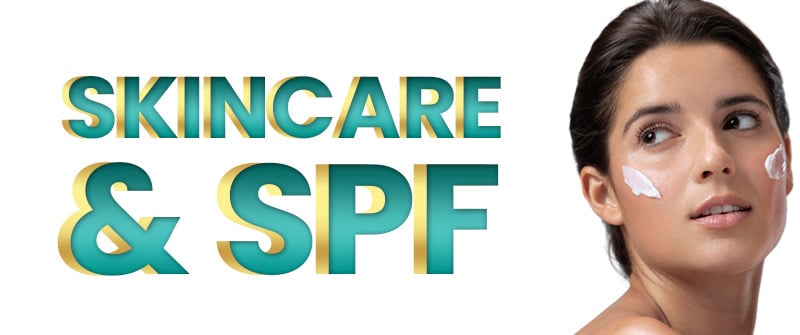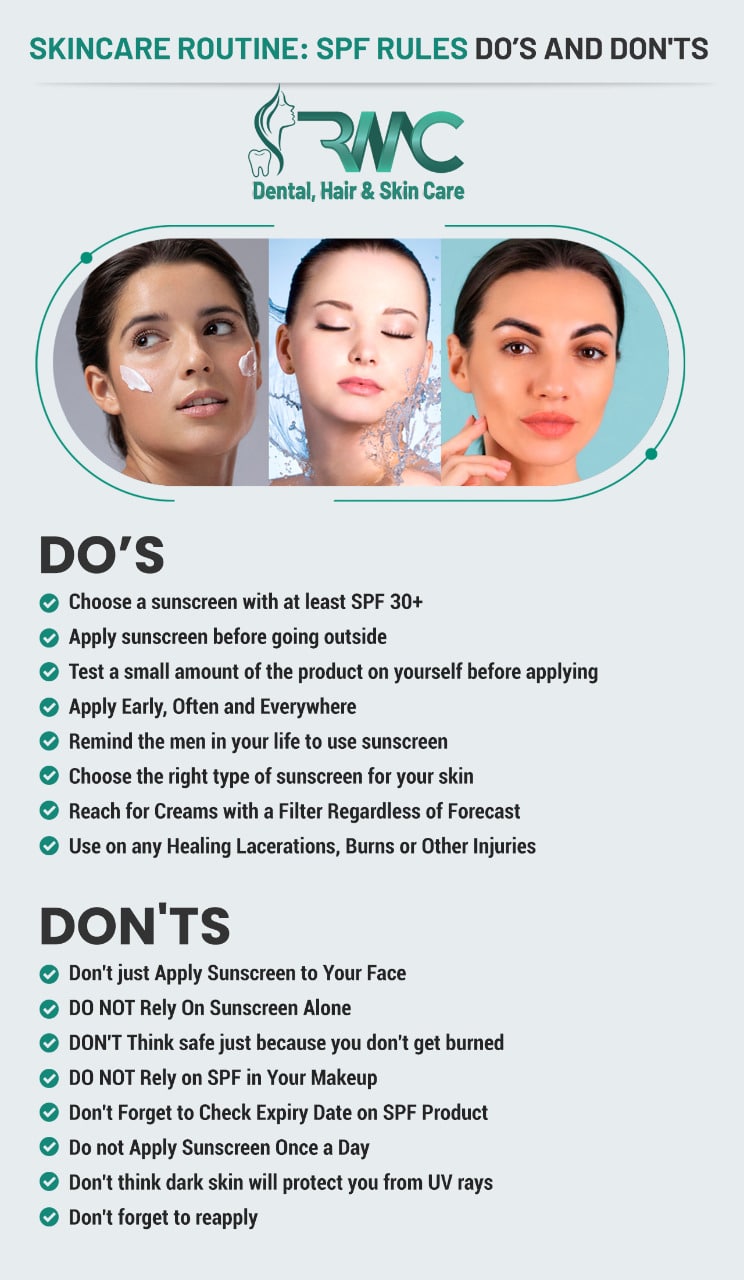SPF Rules: Dos and Don’ts
“Enjoy the Sunshine while Stay Young and Beautiful”
We humans maintain a very complex relationship with Sun as sitting outside on a sunny day is not good for anything, but everyone should be aware of the damage caused by the sun’s rays in the form of sunburn. Sun rays led to skin problems like hyper pigmentation, melasma, wrinkles, melanoma and aging wrinkles effects.
Basically sun damage is a major cause and the most avoidable thing for premature aging. If someone does not protect his/her complexion from damaging UV rays, his/her skin will get damage and destitute of being look beautiful and feel smooth, shiny skin and firm.

Rules to Follow
“It is preferable to use broad spectrum sunscreens with antioxidants and UVA and UVB protection”
Choosing a sunscreen can be overwhelming because with so many different brands, types, and SPF levels available in the market. Here are some guidelines to help you get the best protection for your family:
- Sunscreens labeled “broad-spectrum” will protect against UVA and UVB rays
- Use a minimum SPF of 30
- A formula with added antioxidants can give you extra defense against skin damage
- Zinc-based formulas may work better for sensitive skin
SPF becomes progressively more important to include in a daily skincare routine. While sunscreen should be a year-round staple to protect against the sun’s harmful UV rays, the spring and summer months often have a higher UV index. This means that UV rays are more powerful during the day and your skin is more at risk of sun damage. There are a few dos and don’ts when it comes to sunscreen and general sun protection that everyone should keep in mind before layering on SPF products.

Do’s and Don’t
-
Choose a sunscreen with at least SPF 30+
Sunscreen products with a higher SPF don’t give you much protection. An SPF 30 blocks about 97 percent of UVB rays, while an SPF 50 blocks 98 percent and an SPF 100 blocks 99 percent. SPF 30 is the minimum protection your skin needs, but use a higher SPF sunscreen when you’re going outside for long periods of time.
-
Apply sunscreen before going outside
It can take up to half an hour for your skin to absorb the sunscreen to protect you from the harsh sun rays. So, always plan and apply at least 30 minutes before going out. Apply enough sunscreen.
-
Test a small amount of the product on yourself before applying
Apply a small amount of sunscreen to your wrist first and test for allergic reactions if you’re trying it for the first time or switching to a new brand. In the event that it causes an allergic reaction, stop use immediately and consult a dermatologist about which sunscreen to use.
-
Apply Early, Often and Everywhere
Sunscreen should be applied BEFORE you go outdoors and it’s important to focus on more than just your face. Make sunscreen part of your morning routine and don’t forget to apply it to your ears, hands, arms, legs and scalp. On beach days, apply sunscreen before putting on your bathing suit to protect yourself from burns along the edges of your suit. Reapply the entire amount every two hours and after swimming or sweating.
-
Remind the men in your life to use sunscreen
Studies show that women are twice as likely to apply sunscreen as men; in fact, only 15 percent of men use sunscreen regularly. It’s better to encourage the kids in your surroundings to make sunscreen part of their routine and make sure dads know how to properly apply sunscreen to their kids.
-
Reach For Creams With a Filter Regardless of Forecast
Use sunscreen every day as UV rays can damage your skin, even when it’s cloudy outside. Sunscreen should be applied before running errands, going for walks – and at any time of the year.
-
DO Use Sunscreen On Any Healing Lacerations, Burns or Other Injuries
There is a myth that the sun helps heal wounds. Sun exposure can actually prevent wounds from healing properly, increase the likelihood of scarring, and make existing scars darker. Be sure to cover scars and healing wounds thoroughly with sunscreen or clothing that has an ultraviolet protection factor (UPF).
-
Don’t just Apply Sunscreen to Your Face
Every inch of exposed skin should be covered with sunscreen every day. Don’t forget to apply it to your ears, hands, arms, legs, and scalp. These areas are not only prone to skin aging, due to sun exposure. In fact, the risk of melanoma (skin cancer) is also tremendously high in these parts of the body.
-
DO NOT Rely On Sunscreen Alone
Sunscreen is a must, but it cannot fully protect in all situations. You’ll also want these items in your sun protection arsenal:
Sunglasses with UV protection because the eyelids are delicate and it’s important not to get sunscreen too close to the eyes, especially for little ones. Make sure everyone has sunglasses rated UV400 or higher.
Swim shirts or rash guard shirts with UPF fabric can keep skin safe during long swimming sessions.
Hats are a must if you’re exercising outside, even with sweat-proof sunscreen. A hat with UPF material can provide additional protection.
-
DON’T Think safe just because you don’t get burned
Common misconceptions about sunscreen include the idea that people with naturally darker skin types don’t need sunscreen and the idea that no one needs sunscreen later in the afternoon. The truth is that UVA and UVB rays that cause skin cancer, as well as the visible signs of aging, affect everyone. No one is immune to sun damage, even if they don’t burn easily. UVA and UVB rays can damage your skin at any time of day, even when it’s cloudy or overcast, so reach for sunscreen no matter what the weather forecast!
-
DO NOT Rely on SPF in Your Makeup
Makeup that contains SPF is a great backup to your regular sunscreen, but it shouldn’t be your primary sunscreen. People often don’t apply enough makeup to get adequate protection. Also, you should have sun protection for all exposed areas any time you are outdoors for more than 15 minutes, not just your face.
-
Don’t Forget to Check Expiry Date on SPF Product
It is important to note the expiration date printed on the label of each sunscreen product. Expired sunscreen will not protect you from harmful UVA and UVB rays.
Be extra careful with children’s sunscreen, as children may not realize they’re burning until it’s too late.
Sunscreen should definitely be in your beach bag (in fact, we often pack a cream, a spray, and a stick to make sure everyone is covered for a day in the sun.) However, it should also be a product you use regularly.
-
Do not Apply Sunscreen Once a Day
It is completely wrong to expect one application of sunscreen to last all day. Sunscreen rubs off very easily due to sweat or contact with water. To get the most out of your sunscreen, reapply it every two hours.
-
Don’t think dark skin will protect you from UV rays
Do you literally believe that because your skin is dark, it is not vulnerable to skin cancer? Or do you think you don’t need much sunscreen compared to good skin? Sorry to break it to you, but one is very misunderstood. Fact is that everyone is affected by UVA and UVB rays that cause skin cancer and the visible signs of aging. So, regardless of skin tone, don’t skip sunscreen.
Don’t forget to reapply
Sunscreens rub off very easily due to sweat or contact with water. Reapply as often as you can, every 02 hours. In addition to applying sunscreen, remember to cover as much skin as possible to protect yourself from sun-related skin diseases.
Protect your skin with Rehman Skin Care ……. “Because Beautiful skin requires commitment, not a miracle …!”
Rehman Skin Care will help you out in highlighting your beauty. Rehman Skin Care one of the best skin care consultant with having a team comprises a team of expert medical specialists and doctors in Islamabad.
